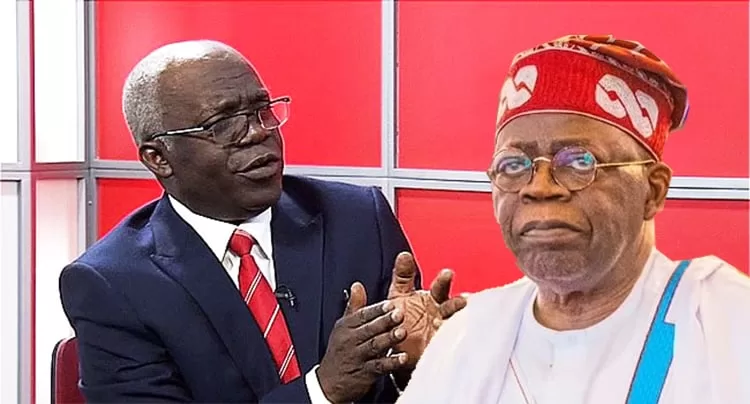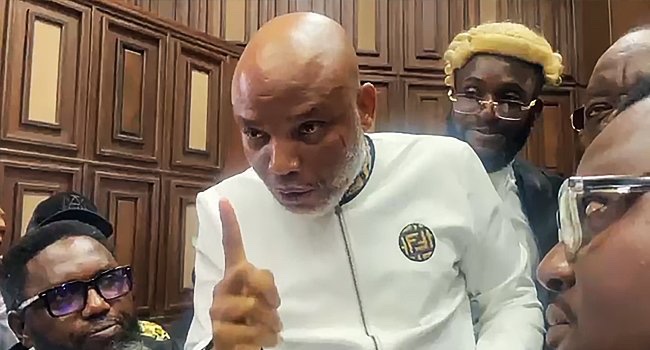
Femi Falana Slams Proposed 5% Fuel Surcharge as Nigerians Brace for More Economic Pain

The debate over Nigeria’s fuel pricing has once again ignited a storm, with senior advocate and human rights lawyer, Femi Falana, SAN, sharply criticizing the Federal Government’s proposed 5% fuel surcharge set to take effect on January 1, 2026.
For millions of Nigerians already battling inflation, job losses, and spiraling living costs, Falana’s words struck a chord — another reminder of how policy decisions at the top can translate to real suffering on the streets.
Speaking in a widely circulated interview first reported by Punch Newspaper, Falana argued that the surcharge would “inflict fresh hardship on a population already stretched beyond breaking point.” His intervention comes at a time when Nigerians are struggling with food inflation above 30%, persistent power shortages, and a currency that has lost nearly half its value in less than two years.
But beyond his criticism of the surcharge, one particular claim by Falana sparked controversy. The senior advocate suggested that petrol from the Dangote Refinery was being sold cheaper in neighboring Togo than in Nigeria. At first glance, the allegation seemed to reinforce popular frustrations — that ordinary Nigerians are always forced to pay more while their resources benefit outsiders.
However, data tells a different story. According to September 2025 figures from GlobalPetrolPrices.com, Nigeria’s average pump price stands at roughly $0.59 per liter, significantly lower than Togo’s $1.22 per liter. Put simply, Nigerians are currently paying less for petrol than their Togolese neighbors. Falana’s statement, while emotionally resonant, does not hold up against verified statistics.
This disconnect between perception and reality is not new in Nigeria’s fuel debates. Aliko Dangote, Africa’s richest man and the face behind the much-publicized Dangote Refinery, has faced relentless criticism despite interventions that have tangibly lowered costs. In April 2024, his refinery crashed the diesel price to ₦1,000 per liter, a move widely praised at the time for easing transport costs and bringing down logistics expenses for businesses. Yet, fast forward to today, Dangote finds himself a lightning rod for public anger.
Why? Analysts suggest the answer lies in the complex interplay of economics, politics, and public sentiment. For decades, Nigeria’s relationship with fuel pricing has been fraught, shaped by subsidy regimes, smuggling, and government promises that rarely materialize. The refinery, hailed as a national savior when construction began, has now become a convenient scapegoat for broader failures in governance and economic management.
On X (formerly Twitter), reactions to Falana’s comments revealed the polarized mood. Some users applauded him for “speaking truth to power,” while others quickly debunked his Togo comparison, accusing him of misleading the public. What was meant to be a critique of government policy spiraled into yet another social media clash — a reflection of how misinformation, whether deliberate or not, fuels division in Nigeria’s already charged atmosphere.
It is important to situate the surcharge within its broader context. Officials argue that the 5% levy is necessary to stabilize revenue flows, fund infrastructure projects, and plug fiscal gaps created by the subsidy removal of 2023. But for everyday Nigerians, such policy justifications often ring hollow. Each hike, surcharge, or tariff adjustment is experienced not as an abstract economic reform but as a direct assault on household budgets.
The optics of the decision could not be worse. With unemployment stubbornly high and poverty levels deepening, the timing of a fresh surcharge feels to many like rubbing salt in a wound. For a government still trying to win public trust, the backlash may prove more costly than the revenue generated.
Falana’s intervention, accurate or not in its specifics, underscores one undeniable truth: Nigerians are exhausted. The endless cycle of fuel debates — subsidy or no subsidy, refinery or no refinery, local production or import reliance — has eroded confidence in both government and corporate actors. Even when prices appear cheaper than in neighboring countries, the perception of exploitation lingers, fanned by political rhetoric and amplified by social media echo chambers.
The Dangote angle further complicates matters. While the refinery is expected to eventually transform Nigeria’s energy landscape, the transition period has left gaps in supply and raised questions about monopolistic control. For the public, the narrative is simple: Dangote is powerful, prices remain volatile, and life keeps getting harder. In such a climate, criticism sticks — even when facts don’t align.
As the January 2026 deadline approaches, the government faces a difficult balancing act. To push ahead with the surcharge risks deepening public anger and fueling unrest. To roll it back, however, would expose fiscal vulnerabilities and undermine efforts to attract investors to Nigeria’s fragile energy sector. Either way, the episode highlights the fragile tightrope between reform and relief.
For now, Falana’s fiery remarks keep the pressure squarely on policymakers. But they also raise a cautionary tale about the responsibility that comes with public advocacy. Facts matter, especially in a country where misinformation can spread faster than official clarifications. The danger is that in the war of narratives, Nigerians are left even more confused — and more frustrated.
At its core, this debate is not just about percentages, prices, or refinery politics. It is about trust — a commodity far more scarce than petrol at the pump.
Watch the video below
The Dangote fuel (taken from Nigeria) is cheaper in Togo than in Nigeria.
— Channels Television (@channelstv) September 14, 2025
So, the government will have to review these developments (the proposed 5% fuel surcharge) and ensure more hardship is not imposed on Nigerians.
-Femi Falana, SAN#PoliticsToday pic.twitter.com/PFIr8fqhMn

